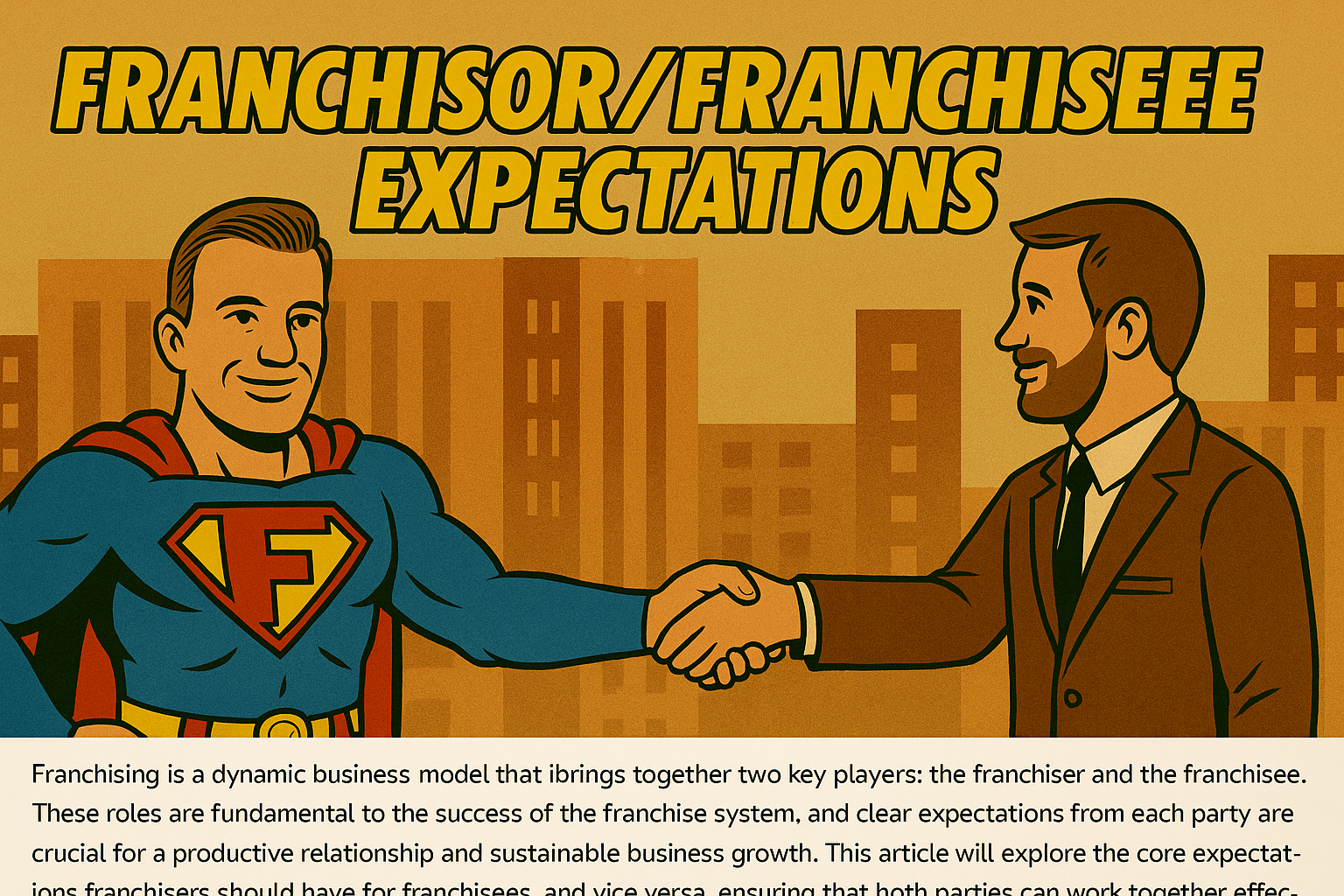Building a Winning Partnership: Franchisor and Franchisee Expectations
Franchise ownership isn’t a solo mission—it’s a business relationship. And like any good partnership, success depends on mutual understanding, communication, and shared responsibility. When you invest in a franchise, you’re not just buying a brand name; you’re stepping into a two-way relationship where both parties must bring their best.
Franchise Man says: “A clear understanding of what’s expected from both sides is your first superpower.”
Let’s break down exactly what franchisors expect from their franchisees—and what franchisees have the right to expect in return.
📌 What Franchisors Expect From You (The Franchisee)
While you’re technically a business owner, you’re operating within someone else’s system. That means the franchisor is trusting you to uphold their standards and reputation. Here’s what they typically expect:
1. Brand Consistency
Franchisors work hard to build a recognizable and trusted brand. They expect you to maintain that identity by:
- Following branding guidelines (logos, colors, uniforms, signage).
- Maintaining cleanliness, service quality, and product consistency.
- Using approved suppliers and vendors where required.
“Every unit represents the brand. Keep the cape clean!” – Franchise Man
2. Operational Compliance
You’re buying into a system that works—so it’s expected that you’ll follow it. This includes:
- Using approved systems, processes, and technology.
- Adhering to training protocols.
- Maintaining operational hours and business standards as outlined in the franchise agreement.
3. Fee Obligations
Franchisors rely on royalty fees and marketing contributions to sustain the broader system. You’re expected to:
- Pay fees on time (typically based on a percentage of sales).
- Contribute to national or regional advertising funds.
- Report accurate financials if required for fee calculation.
4. Engagement and Communication
Good franchisees are active participants in the network. That means:
- Attending franchise meetings and annual conventions.
- Communicating openly about challenges and wins.
- Participating in surveys, pilot programs, or collaborative efforts to improve the system.
5. Positive Representation
You become the face of the brand in your community. Franchisors expect you to:
- Act professionally and ethically.
- Treat staff and customers with respect.
- Avoid legal or PR issues that could harm the brand.
🔄 What You Should Expect From Your Franchisor
This relationship goes both ways. You’re investing significant time and capital, and you deserve strong support in return. Here’s what you should expect:
1. Proven Systems and Training
The whole point of franchising is tapping into a working model. Your franchisor should:
- Provide thorough initial training.
- Offer easy-to-follow operations manuals and checklists.
- Give access to ongoing training and development opportunities.
Franchise Man says: “No hero should start without knowing how to use their tools!”
2. Marketing Support
You’re contributing to the brand’s marketing fund—so what do you get in return?
- National or regional advertising campaigns.
- Branded materials for local marketing (flyers, social posts, templates).
- Digital marketing strategies and SEO support, depending on the brand.
3. Technology and Tools
Modern franchisors offer systems that make running your business smoother, like:
- Point of sale (POS) systems.
- Scheduling and HR software.
- Financial reporting tools.
- CRM and marketing automation systems.
4. Field Support
You should have access to business consultants or support managers who:
- Visit regularly for performance reviews.
- Help with goal setting and problem-solving.
- Offer insight into improving operations or increasing profitability.
5. Network and Community
Great franchisors foster a culture of community through:
- Peer forums or intranet platforms.
- Annual conferences and regional meetups.
- Recognizing top performers and sharing best practices.
⚖️ The Franchise Agreement: The Rulebook for Expectations
Everything about the franchisor/franchisee relationship is formalized in the Franchise Agreement—a legal document that outlines:
- Your territory.
- Length of the contract.
- Rules, restrictions, and obligations.
- Termination and renewal clauses.
- Dispute resolution methods.
Before signing, review it with a franchise attorney. It’s the playbook for your partnership.
🧠 Managing Expectations: Tips for Success
- Ask upfront. Before signing, ask the franchisor about expectations on both sides.
- Overcommunicate. Problems often stem from misunderstandings. Keep communication open.
- Be coachable. A franchisor’s advice isn’t criticism—it’s guidance.
- Engage with peers. Other franchisees are a goldmine of insight and support.
- Stay proactive. Don’t wait for problems to escalate—speak up early.
🦸♂️ Conclusion: It’s a Team Effort
At its best, a franchise relationship is a true alliance. The franchisor brings the blueprint, the branding, and the battle-tested systems. The franchisee brings energy, execution, and local ownership.
Franchise Man reminds us: “You can’t save the business world alone. Even superheroes need partners.”
When expectations are clear—and met on both sides—you’ve got the recipe for lasting success, profitability, and purpose.
📅 Stay tuned for next week’s Franchise Man Epilogue:
“How to Research a Franchisor’s Track Record (Before You Commit)”

